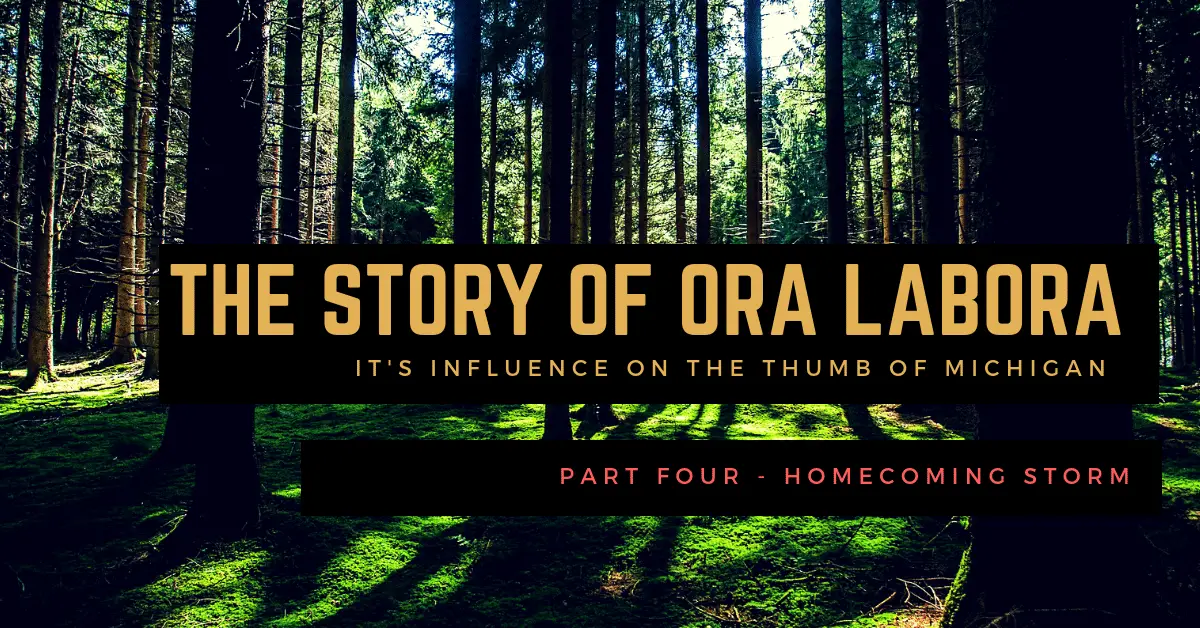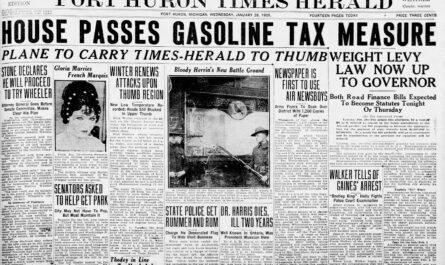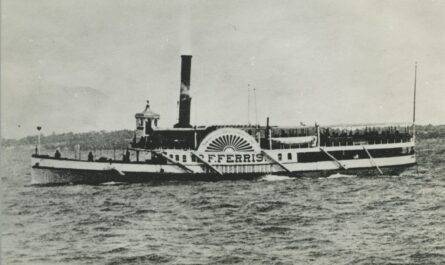It was Christmas Eve 1864 and Emil Baur was alone. He was in Bay City attending services and conducting business for the desperately struggling Ora Labora colony. Alone in a room that a friend had let him stay in, he took pen to paper and pleaded to his benefactors. He asked the Elders of the Harmony Colony in Economy Pennsylvania for an additional loan in which to purchase provisions for the rest of the winter ahead.
The Ora Labora Colony Continues to Struggle in the Civil War’s Final Days
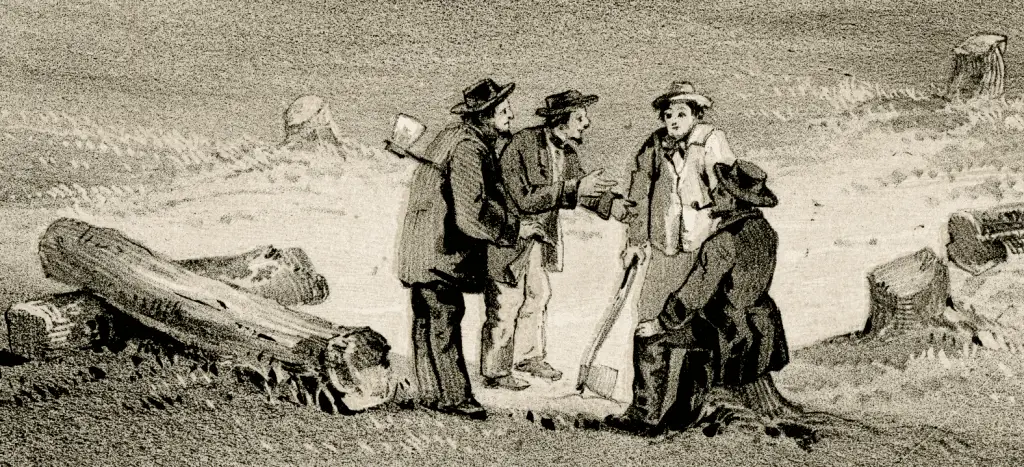
The fall harvest had been poor and some of the key leaders and other men have been drafted into service by the Union Army. He also asked for forgiveness of the loan interest payment that was due because the colony had exhausted most of the available funds.
Despite the hardships and setbacks, he still had grand visions for the colony. A steamer company had promised to stop in Wild Fowl Bay twice a week if the colony would build a 1500-foot dock out to the deep water. With this dock, the colony could export finished lumber and take in supplies. Shipping was less expensive and time-consuming then ox train transport down to Bay City via the Indian Trail. Building the dock would be a huge boost to the community and they could become a trading epicenter in the eastern Thumb region. Emil wanted the dock but lamented diverting the remaining men to build it and purchasing additional lumber was not possible. Maybe in the spring.
A New Year, A New Scheme for Money
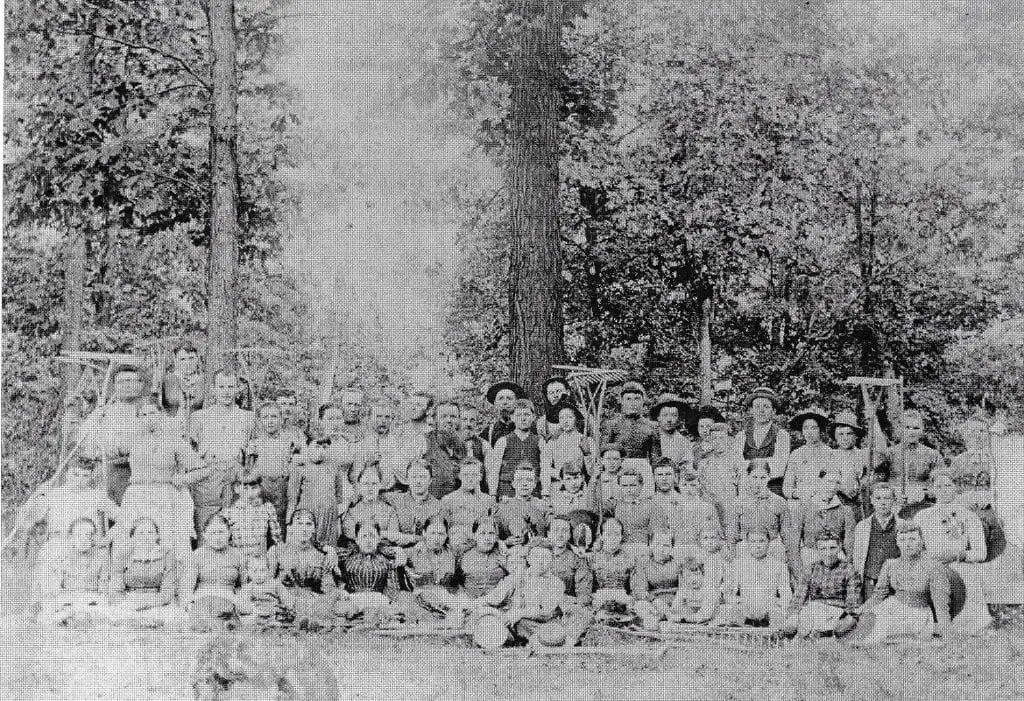
The new year brought the potential for a fresh start but a bit of tough love from Harmony. The trustees in Economy sent Emil a check for $1,000 but with a string attached that Ora Labora issues them a Judgement Note extending over three years with interest. They agreed to not collect the interest due but defer it. It would be added to the loan. In February, Emil wrote back to Economy and readily agreed to the Note. With his response, he included another money-making proposition for the Trustees.
A former state geologist named Alexander Winchell from the University of Michigan had replied to an inquiry made by Emil about the potential to tap into a supposed salt brine outcropping in the area. Salt wells had been drilled in Bay City and Port Austin. Winchell indicated that the colony was literally sitting perfectly on top of a formation known as the Onondaga Salt Group. He noted that it was likely that its superior brine could be tapped into as it “would not exceed one hundred feet”.
A Famous Geologist Gives Ora Labora Hope
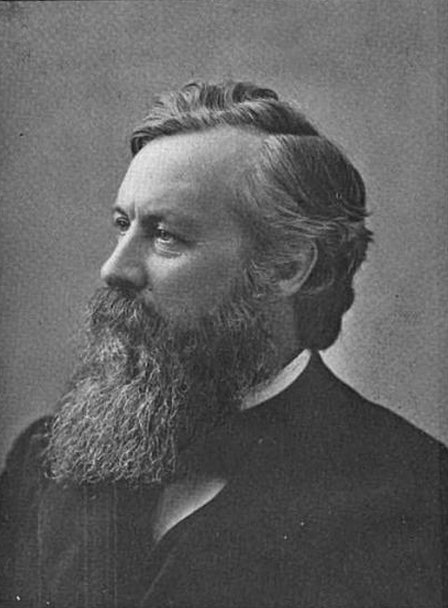
Winchell was a noted geologist and popular lecturer and writer on scientific topics. His reputation as a Methodist layman who worked to reconcile traditional religious beliefs to nineteenth-century science likely piqued the interest of Baur. Winchell was appointed state geologist of Michigan in 1859 while keeping his position at the University of Michigan. Winchell’s surveyed the geology of the Lower Peninsula most notably the sedimentary rocks underlying that part of the state. A progress report was published in 1861. By the winter of 1865, salt brine was being extracted and distilled to pourable salt. It was a huge commodity around the Great Lake region used mostly for curing and food storage.
Emil wasted no time in exhibiting his youthful exuberance in asking to start a salt mine operation. He forwarded the correspondence from the geologist and offered a 50/50 split with Economy in exchange for funding. He was met with a cold answer. The Trustees had the first-hand experience with salt block operations. They found them not very profitable. The trustees urged the young colony leader to continue with lumbering operations as, “You have lots of wood, and you could sell lots of wood to such salt mine operators, also your sawmills will receive many orders”.
Colony Prosperity Tempered with Economic Reality
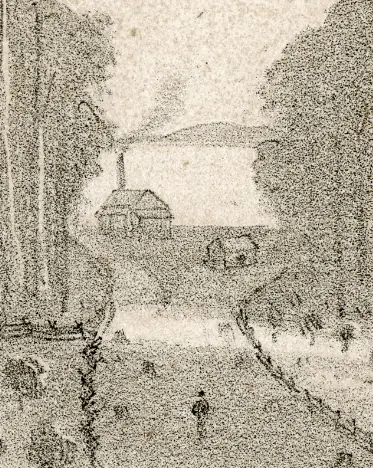
By July the war was just about over. Michigan had almost 90,000 men, nearly a quarter of the state’s male population, to fight the Civil War. Emil looked forward to the return of the men of the colony. Of particular note was Brother Louis Faul whom it appears that Emil hoped would take over the direct leadership of the colony. However, the war’s end brought along an economic downturn. The price of lumber dropped so the colony decided to not mill any more finished products until prices returned. However, their small cattle herd was growing and the fruit trees, which were planted throughout the colony’s streets, were beginning to bare sweet cherries.
The year continued with little correspondence back from the trustees in Harmony until November. The trustees told Emil that no decision had been made to extend further lines of credit. Furthermore, the group was not happy when they were asked yet again to defer interest payments on the colony’s large loan. The trustees instructed Emil to “to make a few inquiries by your wealthy brothers in faith since we do not desire to become too deeply involved. It was a frosty response and no further support was to be forthcoming.
Veterans Return from War and the Situation is Grim
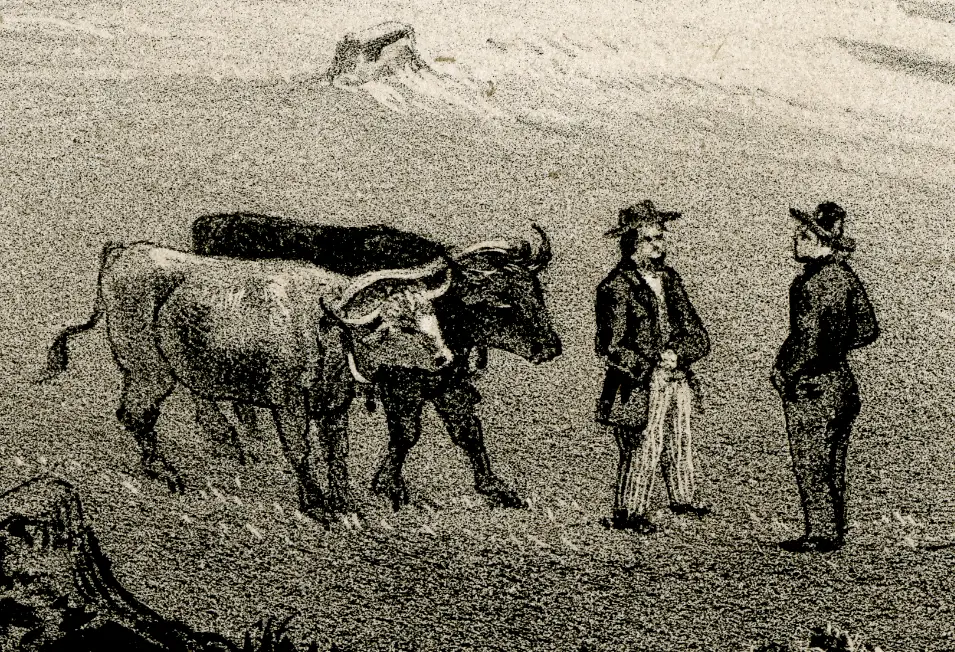
Louis Faul and Jacob Kolb return from the battlefield and were in no mood to deal with Emil Baur. Based on the lengthy correspondence by Baur to the trustees in Harmony it was evident that the veterans quickly ascertained that the colony was deeply in debt and barely functional.
By November of 1865, the financial situation was desperate. Some thought that Baur was skimming profits. Likewise, there were charges leveled against Jacob Kolb who was accused of stealing funds. While details are sketchy on this point, Kolb may have insinuated that Baur had embezzled $1,000 from the colony in order to buy his way out of conscription. Colony residents accused Kolb, the shopkeeper, of marking up items and keeping the profit. This led to Kolb’s expulsion from the sect and Louis Faul quickly resigned as secretary. Baur also offered his resignation but it was refused.
A Fight for Control of Ora Labora
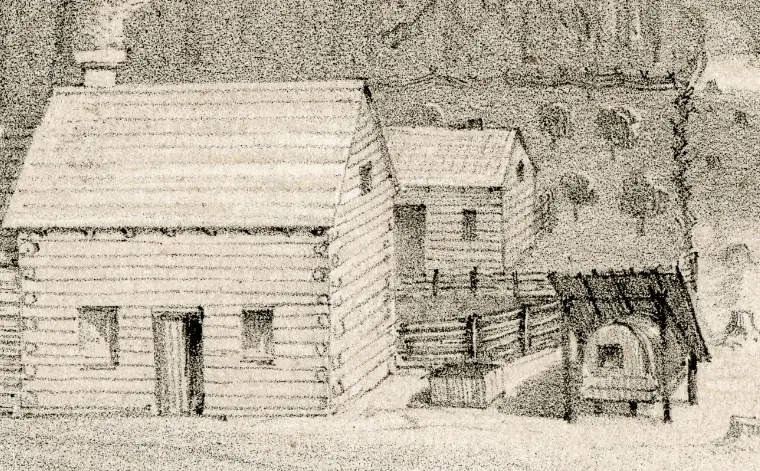
In his final remarks to the colony leaving Louis Faul informed the assembly that he had formed a group in opposition to Emil’s leadership composed of some members of the colony and some outsiders mentioned to be part of the “Odd Fellows”. Baur called the Odd Fellows, a fraternal organization, a “secret society” and cancer on humanity. In reality, the group was likely comprised of local farmers and merchants that were owed money by the colony. Clearly, it appears that Kolb and Faul tried and failed to wrestle control of the colony away from Emil.
Louis Faul was not done with exacting his revenge on Baur and the rest of the colony. As postmaster, Louis reviewed the financial records, discovered that Ora Labora’s Post Office was losing money. Faul advised the US Postmaster to move operations to Sebewaing. As a result, the post office closed on February 10, 1866. This closure infuriated Emil as he placed the loss of the postal operation as a critical benefit of the colony. He took steps to restore the post office a few months later in the year. The tiny German Colony, Ora Labora P.O. Huron County, Mich. post office remained on-site under postmaster Herman Roedel until 1872 when it was moved to Bay Port.
The Beginning of the End of Ora Labora
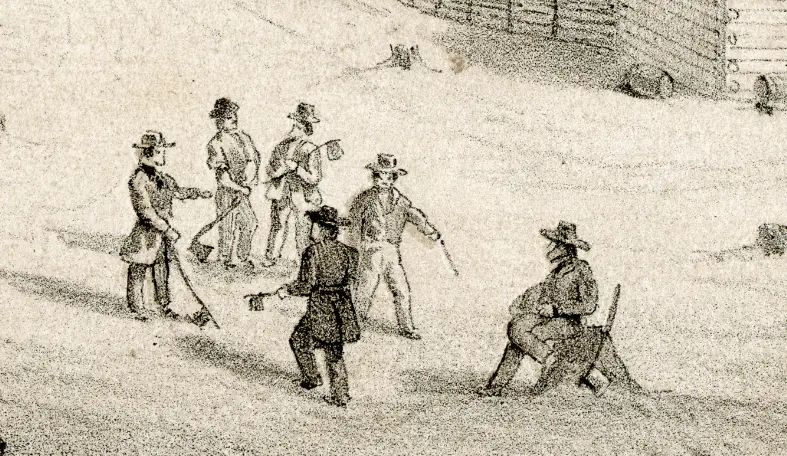
The winter of 1866 was the beginning of the end for the social experiment of Ora Labora. The harsh reality of not being able to quickly clear land and sow crops to turn a profit doomed the colony. The situation was only extended by short-term loans from its benefactor in Pennsylvania. Emil would place the blame of the financial situation on Faul and Kolb, but these two men had been in the Army for over two years. It appears that they came back to a rudderless operation. Upon arrival, creditors look to have descended on the two veterans looking for leadership and money to pay outstanding debts.
The story turns from here on one of Emil’s last schemes to keep the Colony going and how Ora Labora begins to unravel and its effect on the communities of the Upper Thumb.
Related Reading About Ora Labora
Ora Labora – A Lost Colony In Michigan’s North – Part One – Ora Labora is known as “Christian German Agricultural and Benevolent Society of Ora et Labora” (Pray and Work), where it’s parishioners could combine work with prayer, and live according to the Methodist Church Discipline. Founded in 1862.
Ora Labora – A Lost Colony in Michigan’s North – Part Two – Part II of the Ora Labora story outlines the summer of 1863. The building is rapid and progress exciting in Michigan’s north. But the looming effect of the Civil War is about to impact this fledgling German religious colony.
Ora Labora – A Lost Colony in Michigan’s North – Part Three – Part III of the Ora Labora story brings us to 1864. The rapid growth of the colony was costly and the society needs funds to grow. It was time for drastic measures. The raging war in the south was turning in the North’s favor.
Ora Labora – The Final Days Of The Colony 1866 – Part Five – Ora Labora’s final viable year as a religious colony in the wilderness of the upper thumb of Michigan was 1866. We reveal the final desperate attempts to keep it going.
Port Hopes Restored Train Depot – The eastern Thumb town of Port Hope has painstakingly restored a turn of the 1900’s railroad depot. It hosts a great collection of railway
Sources Consulted
- Ora Labora: Experiment in Communal Living, Caseville Historical Museum, Unpublished.
- Translated Letters of Ora Labora from Dr. Robert Conway. Private Collection.
- Ora Labora — A German Methodist Colony. Parts I & II, May 1982, Adrian College
- Nixon, “The Society of Separatists of Zoar,” Dissertation., p.162.
- Ohio History Journal – The Ohio Historical Quarterly p 136
- Transcription of Letters Written by Adam Harder. Transcribed by Howard Harder, a son of Frederick Zechariah Harder. Courtesy of Dave and Helen (Hutchins) Damouth
Related Exploring with Michigan History
- Huron County’s Poor Farm
- Christian German Agricultural and Benevolent Society of Ora et Labora
- Port Crescent – A Ghost Town in the Thumb
- The Northern Michigan Jewish Colony of Palestine
Discover more from Thumbwind
Subscribe to get the latest posts sent to your email.

